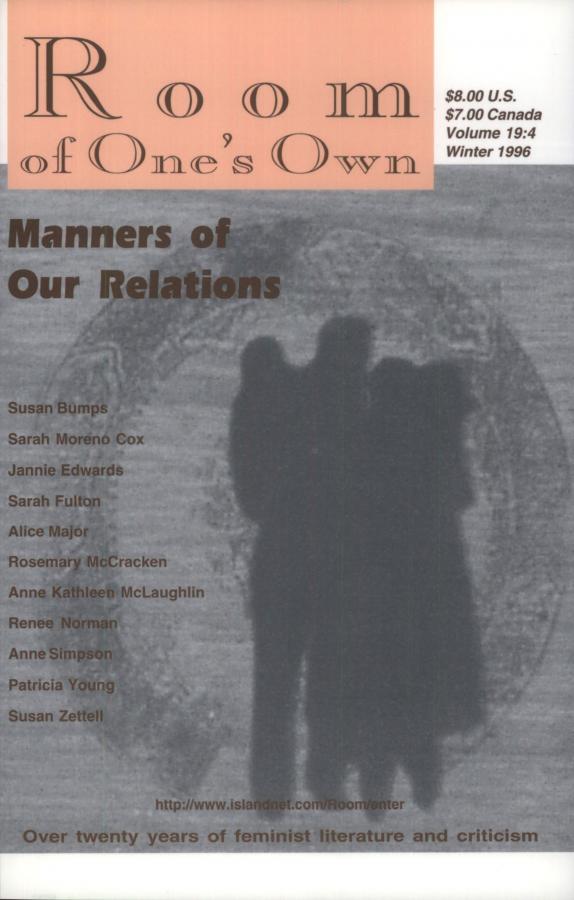Manners of Our Relations | 19.4
1996
Digital only; out of stock in print.
Welcome, readers, to an issue of the winning entries of our second annual “In the First Person” literary contest. It would be fair to say that reading and judging all the entries con sumed the energy of our collective members for the better part of this fall. We were fortunate enough, once again, to have Gayla Reid judge the final entries. I say we were fortunate not only because Reid has one of the finest pair of literary eyes in the country, but because she took the time out of her busy schedule—a day or two after handing back the manuscripts, she left for Australia to launch a new book—to do the honour of selecting, from nine finalists, the work that won first, second, and third prize.
The call for entries went out last year as “All My Relations.” As a large number of manuscripts we receive are about relationships of one sort or another, we thought it an appropriately broad category in which writers could explore the complexity of how women relate. Certainly the winning entries reflect the diversity of the materia l we received. Oddly enough, few manuscripts we read were about conjugal relationships; none made the short list.
The work on the cover continues the theme of relationships. This piece, taken from Julie Flett’s installation presently touring Canada, speaks to the complexities of the relationships between her Métis culture and the surrounding, insistent one that dominates. The silhouettes—of people, relations perhaps—are the absence of family photos to deliver the nuance of family dynamics; the plate pattern was once chosen by Métis families to help them “fit in.” The elements of cultural compliance, assimilation, and eradication are evident in the tension of Flett’s creative sensibilities.
All three of our winners, this time, happen to be from British Columbia. This is unusual, as we accept manuscripts from writers around the world but, in a way, fitting, as the yield of excellent West Coast writing—and, of course, writers— is abundant.
Second prize was taken by Patricia Young, also of Victoria, BC. Her three poems, said Reid, particularly “The Dress,” are fully realized pieces about the legacy of mother to child.
First prize goes to Sarah Moreno Cox of Victoria, BC, for “Paradise is Close, Surely.” Reid commented that this piece “has a marvellous central character, the mother. This is a Salvadoran family, relocated and dislocated in the first world. The Canadian-based narrator seems to float at the edge of her story, allowing its themes to emerge through the mother’s habits, her enthusiasms, and—above all—her dreams. At this family Christmas in Los Angeles, nothing is certain except the magnitude of past and present losses.
Third prize went to Coquitlam’s Renee Norman for her creative non fiction piece, “Surviving Treason: Writing the Layers of Our Lives.” Reid commented, “We meet a feminist poet reflecting on a prose poem that has rocked her marriage. This piece is both an act of self-disclosure and a subtle examination of the writing life, where truth is inevita bly a form of distortion.
The next six pieces of this issue are runners up in the contest. They appear in this issue because the quality was high enough to draw the attention of the collective. We congratulate all the women whose work appears here.

$10.00
Additional information
| Delivery | Canada, USA, International, Digital |
|---|
In this issue: Virginia Aulin, Susan Bumps, Sarah Moreno Cox, Jannie Edwards, Sarah Fulton, Alice Major, Rosemary McCracken, Anne Kathleen McLaughlin, Renee Norman, Wendy Putnam, Anne Simpson, Cathy Stonehouse, Patricia Young, Suzanne Zettell